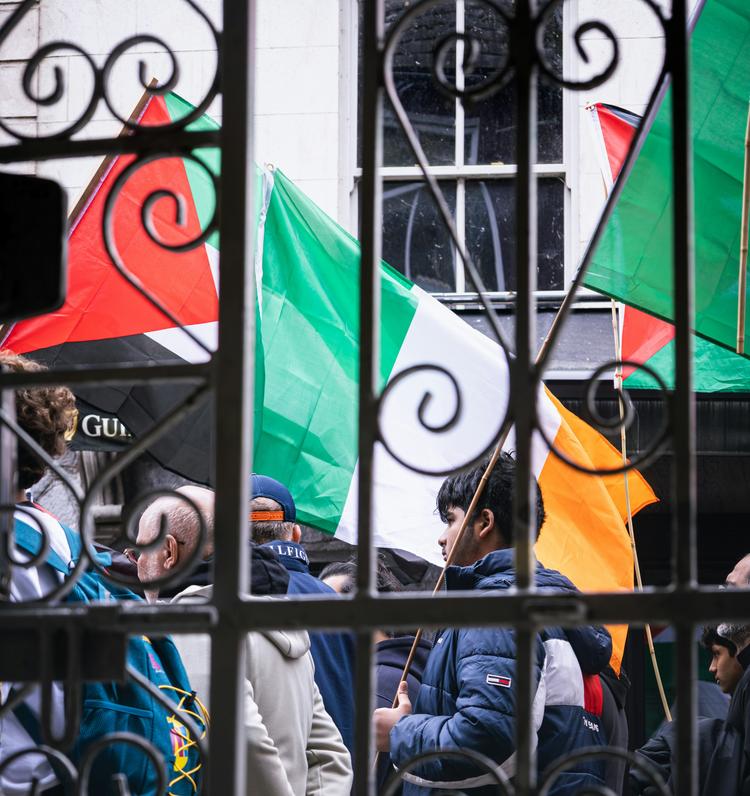Catherine Connolly’s victory: Europe’s moral rebellion against the Israeli occupation
( Middle East Monitor ) – When Catherine Connolly was elected President of Ireland, the shockwaves were felt far beyond Dublin. Her victory was not a symbolic gesture, nor a routine political milestone. It was a direct moral rebuke to the Israeli occupation and to the lobbying networks that have relied on silencing, intimidating, and dictating Europe’s discourse on Palestine for decades.
Those networks understood the danger immediately. Their panic was not about the limited constitutional powers of the Irish presidency; it was about something far more threatening to them: the collapse of narrative obedience in Europe. Connolly’s rise signalled that a European electorate, when fully awake and fully informed, can no longer be manipulated into calling genocide “self-defence” or occupation “security.”
Ireland’s memory of occupation
Ireland knows occupation not from textbooks but from experience. It is a nation that remembers siege, dispossession, and the machinery of colonial power. No media spin, however well-funded, can persuade such a people that the slaughter of trapped civilians is a “right.” That is why the Irish streets overflowed in solidarity with Gaza during Israel’s recent atrocities. As Nelson Mandela declared, “Our freedom is incomplete without the freedom of the Palestinians.” For many Irish voters, Connolly embodied that moral instinct — unfiltered, unapologetic, and unafraid.
The backlash of fear
The pro-occupation backlash was swift and vicious. The aim was not to debate but to delegitimise, intimidate, and silence. They fear Connolly not for what she can sign, but for what she can say — because she speaks unvarnished truths: ethnic cleansing, collective punishment, war crimes. Words that shatter the comfortable illusions on which European complicity has rested.
Frantz Fanon wrote that colonialism “is not a thinking machine… it is naked violence.” Those who defend that violence know that once exposed, it begins to crumble. Connolly has torn away the mask. She refused to repeat the cowardly vocabulary that equates occupier and occupied, or the euphemisms that Western leaders hide behind. She named the crime — and in doing so, broke the spell of fear.
A turning point for Europe
This is bigger than Ireland. It is a moment of moral reckoning for a continent that has preached human rights while arming their violators. Aimé Césaire warned Europe that “no one colonises innocently, and no one colonises with impunity.” Today, Europe stands before a mirror: either honour the values it claims to defend or admit that those values were never universal. Ireland, true to its history, has chosen the side of the oppressed.
For Palestinians — especially in the diaspora — Connolly’s victory proves that the battle for narrative in the West is winnable. The occupation may dominate weapons, corporations, and lobbies, but it is losing the moral argument. Each honest voice, especially from within Europe, accelerates that loss.
Beyond celebration: a strategic opening
This is not a moment for applause and retreat. It is a strategic opening that must be widened — to build stronger alliances, challenge censorship, and bring Palestinian voices deeper into European civil society. The Irish experience offers a clear lesson: when truth is spoken plainly, people choose justice.
The fury raging through pro-occupation circles today is the clearest evidence of all. One only fears what truly threatens.
A message to the world

Photo of pro-Palestine protest in Galway City, Ireland, by Tristan O’Connor on Unsplash
Ireland has sent a message — to Europe, to Palestine, and to every nation watching: the era in which colonial violence enjoyed moral immunity is ending. Connolly’s office may be ceremonial, but her victory is not. History does not side with the coloniser. It sides with those who speak, resist, and refuse to kneel.
And today, Ireland has chosen to stand.
The views expressed in this article belong to the author and do not necessarily reflect the editorial policy of Middle East Monitor or Informed Comment.
 Unless otherwise stated in the article above, this work by Middle East Monitor is licensed under a Creative Commons Attribution-NonCommercial-ShareAlike 4.0 International License
Unless otherwise stated in the article above, this work by Middle East Monitor is licensed under a Creative Commons Attribution-NonCommercial-ShareAlike 4.0 International License

 © 2026 All Rights Reserved
© 2026 All Rights Reserved